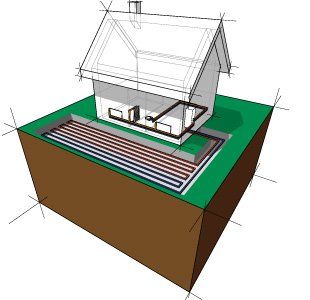
Homeco Energy Ground source heat pumps
| Energy Source | Tariff |
|---|---|
| Ground Source Heat Pump | 20.89p/kWh |
| Air Source Heat Pump | 10.71p/kWh |
| Solar Thermal | 21.09p/kWh |
What is a ground source heat pump?
- lower fuel bills, especially if you replace conventional electric heating
- could provide you with an income through the government´s Renewable Heat Incentive (RHI)
- lower your home´s carbon emissions, depending on which fuel you are replacing
- don't need fuel deliveries
- can heat your home and provide hot water
- need little maintenance - they're called ‘fit and forget´ technology
Ground source heat pump savings
| Existing system | Ground source heat pump performing at 250% | Ground source heat pump performing at 300% | |
|---|---|---|---|
| Gas | £/year | £0 | £130 |
| Carbon dioxide/year | 350kg | 800kg | |
| Gas | £/year | £480 | £610 |
| Carbon dioxide/year | 4,820kg | 5,270kg | |
| Oil | £/year | £180 | £310 |
| Carbon dioxide/year | 1,180kg | 1,640kg | |
| Solid | £/year | £200 | £330 |
| Carbon dioxide/year | 4,950kg | 5,410kg |
FAQ
- How do ground source heat pumps work?
Heat from the ground is absorbed at low temperatures into a fluid inside a loop of pipe (a ground loop) buried underground. The fluid then passes through a compressor that raises it to a higher temperature, which can then heat water for the heating and hot water circuits of the house. The cooled ground-loop fluid passes back into the ground where it absorbs further energy from the ground in a continuous process as long as heating is required.
Normally the loop is laid flat or coiled in trenches about two metres deep, but if there is not enough space in your garden you can install a vertical loop down into the ground to a depth of up to 100 metres for a typical domestic home.
Heat pumps have some impact on the environment as they need electricity to run, but the heat they extract from the ground, the air, or water is constantly being renewed naturally.
- Is a ground source heat pump suitable for me?
- It doesn't have to be particularly big, but the ground needs to be suitable for digging a trench or a borehole and accessible to digging machinery.
- Is your home well insulated? Since ground source heat pumps work best when producing heat at a lower temperature than traditional boilers, it's essential that your home is insulated and draught-proofed well for the heating system to be effective.
- What fuel will you be replacing? The system will pay for itself much more quickly if it's replacing an electricity or coal heating system. Heat pumps may not be the best option for homes using mains gas.
- What type of heating system will you use? Ground source heat pumps can perform better with underfloor heating systems or warm air heating than with radiator-based systems because of the lower water temperatures required.
- Is the system intended for a new development? Combining the installation with other building work can reduce the cost of installing the system.
- Costs, savings and earnings
Costs
Installing a typical system costs around £9,000 to £17,000. Running costs will depend on a number of factors - including the size of your home and how well insulated it is.
Savings
How much you can save will depend on what system you use now, as well as what you are replacing it with. Your savings will be affected by:
- Your heat distribution system - If you have the opportunity, underfloor heating can be more efficient than radiators because the water doesn't need to be so hot. If underfloor heating isn't possible, use the largest radiators you can. Your installer should be able to advise on this.
- Your fuel costs - You will still have to pay fuel bills with a heat pump because they are powered by electricity, but you will save on the fuel you are replacing. If the fuel you are replacing is expensive you are more likely to make a saving.
- Your old heating system - If your old heating system was inefficient, you are more likely to see lower running costs with a new heat pump.
- Water heating - If the heat pump is providing hot water then this could limit the overall efficiency. You might want to consider solar water heating to provide hot water in the summer and help keep your heat pump efficiency up.
- Using the controls - We can ensure that each area of your property is ‘zoned´ and therefore can be controlled via individual room thermostats. This will ensure the maximum efficiency of your heat pump system is gained.
These are the savings taken from the Energy Saving Trust website that you might make every year when replacing an existing heating system in an average three-bedroom semi-detached home with a typical GSHP installation and a good installation:
- Maintenance
Heat pump systems typically come with a 10-year warranty. You can expect them to operate for 20 years or more, however they do require regular scheduled maintenance. A yearly check by you and a more detailed check by a professional installer every 3-5 years should be sufficient. The installer should leave written details of any maintenance checks you should undertake to ensure everything is working properly. Consult with your supplier for exact maintenance requirements before you commit to installing a heat pump.
The Ground Source Heat Pump Association say that there is no need for safety checks for ground source heat pumps and that routine maintenance requirements are very low. These may include pre-heating season checks of the water pump, external pipes and fittings and electronics.
- Planning permission
In England, Scotland and Wales, domestic ground source heat pumps are generally allowed as permitted developments, but check with your local authority to find out whether you need planning permission or not.






